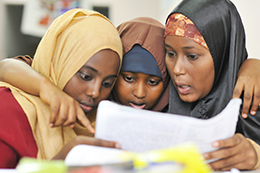10 October 2016
 Researchers from the University of South Australia hope to fill an important gap in our understanding of how young refugees make the transition to further education and employment and develop the resilience to build successful lives post settlement.
Researchers from the University of South Australia hope to fill an important gap in our understanding of how young refugees make the transition to further education and employment and develop the resilience to build successful lives post settlement.
The ground-breaking new study led by senior lecturer at UniSA’s School of Nursing and Midwifery, Dr Tahereh Ziaian, is being launched this month. It will explore the success of different factors in helping and supporting young refugees, many who have experienced some trauma, into work, education and a state of wellbeing.
Dr Ziaian says while there is a growing body of literature to support the case that adult refugees make a positive impact on the nation’s skill level, the focus on children and adolescents is relatively overlooked, particularly in Australia.
She says until recently, the literature on migration and education outcomes has also failed to take account of the experiences of refugees as a distinct group from other migrants.
“Young refugees have enormous potential to enrich our culture and make a contribution but often they face unique set of barriers to completing higher education and finding employment, making it difficult for them to excel in a new and unfamiliar environment,” Dr Ziaian says.
“Our project responds to ethical and social justice concerns, because it will contribute new insights, resulting in significant improvements to the long-term employment opportunities of refugee youth.
“Our previous research shows that young refugees are at increased risk of developing mental health problems and have trouble accessing support services, but despite those obstacles most are coping extremely well.
“They are actually defying the odds, exceeding society’s expectations and proving they have the resilience to push through obstacles.”
Dr Ziaian believes much more can be done to help young refugees transition from school into further education and become productive Australia citizens.
“The evidence suggests that any investment in support for young refugees will pay off,” she says.
“We need to break down discriminatory barriers to employment to give young refugees the chance to show what they can do.”
Through the study, Dr Ziaian and her team hope to influence education, training and employment practices by defining the services and factors young refugees need to maintain their resilience and actively participate in the community.
As we mark World Mental Health Day, a day for global mental health education, awareness and advocacy, Dr Ziaian and her team are focused on ensuring local outcomes make a national impact.
“We expect our results will be a valuable reference point for Australian decision-makers in the education and employment sectors and offer significant findings to inform state and federal policy,” Dr Ziaian says.
The research is funded through a grant from the Australian Research Council in partnership with the University of Adelaide and Multicultural Youth South Australia.
As part of the three-year study, the team will survey 600 young refugees from the Middle East, South Asia and Africa who have migrated to Australia during or after 2003.
Data will be collected from refugees aged 15-24 years, their parents or primary caregivers, and their schoolteachers.
Anyone interested in taking part in the survey or anyone who would like to refer refugees to the study, can contact postgraduate researcher Peter Squires on 0422 224 179 or email peter.squires@mymail.unisa.edu.au.
About Dr Tahereh Ziaian
Specialising in the area of cross-cultural mental health, Dr Tahereh Ziaian’s research is international in its reach.
Experienced in leading competitive research grant projects and delivering significant outcomes for the health sector, Dr Ziaian is also dedicated to mentoring PhD candidates and creating rewarding opportunities for her students.
A migrant herself, she arrived in Australia 30 years ago.
Her passion for improving the health, wellbeing and quality of life for refugee communities stems from her own experiences as a community health psychologist, an educator and researcher. .
Her specific interest in supporting children, youth and women to fulfil their aspirations, become active citizens and build a sense of belonging has been the driving force behind her research in this area.
Dr Ziaian is a senior lecturer at UniSA’s School of Nursing and Midwifery.
Media contact: michele.nardelli@unisa.edu.au mobile 0418 823 673


